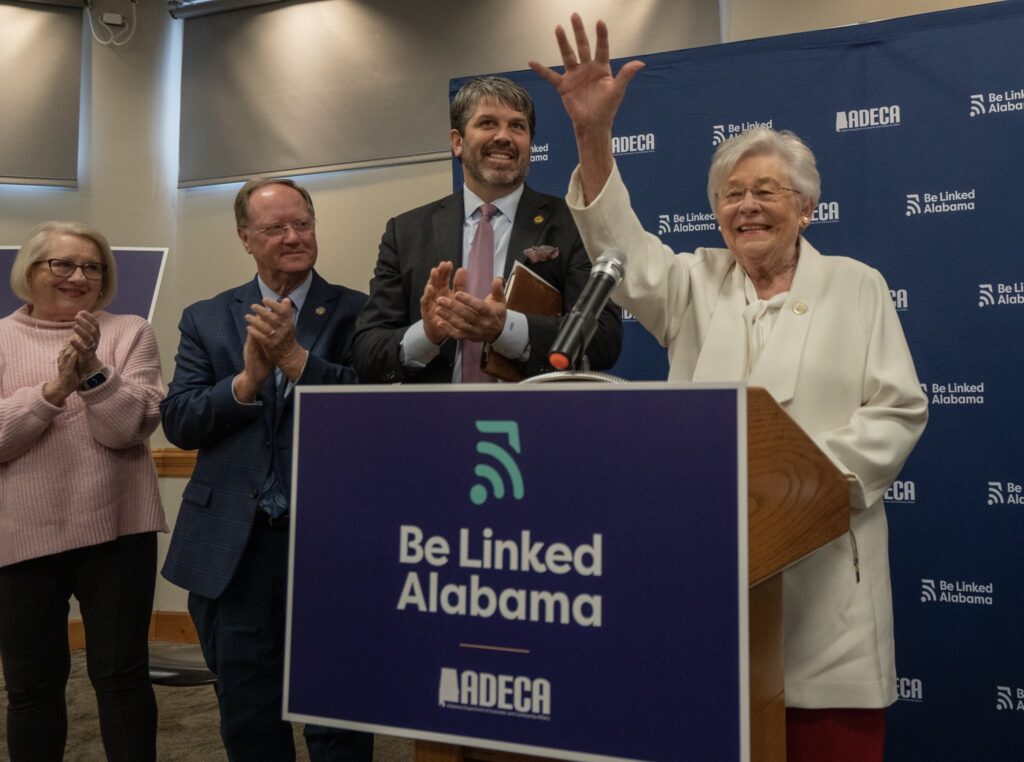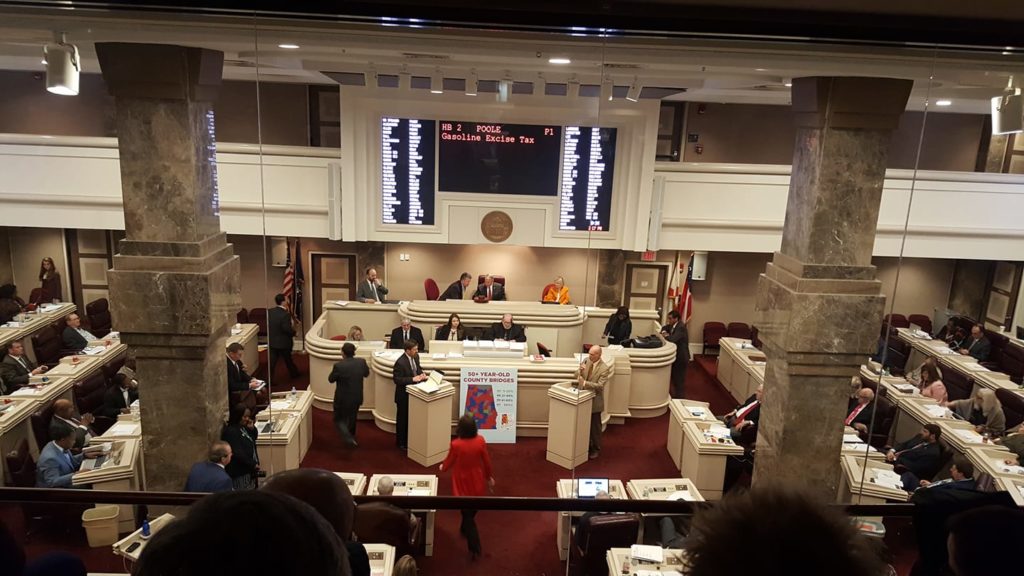Gov. Kay Ivey says Alabama is making progress on expanding digital infrastructure

Alabama Governor Kay Ivey (R) on Monday continued her broadband tour with an event at Cullman Electric Cooperative in Cullman County. Ivey discussed upcoming broadband projects in Cullman and Winston counties. “Our presence in Cullman County today underscores our commitment to providing access to high-speed internet for every Alabamian,” said Gov. Ivey. “The remarkable strides made here, supported by the Alabama Broadband Accessibility Fund and Cullman Electric Cooperative, signify our dedication to connecting unserved residents. This milestone represents our journey towards statewide connectivity, demonstrating that when one community gains access, we all move closer to a more connected and prosperous Alabama.” Ivey was joined by Alabama Department of Economic and Community Affairs (ADECA) Director Kenneth Boswell, Cullman Electric Cooperative CEO Tim Culpepper, state Sen. Garlan Gudger (R-Cullman), and state Reps. Randall Shedd (R-Cullman) as well as Tim Wadsworth (R-Arley). The speakers addressed the nearly $7 million in grant and matching funds committed for broadband projects in the area. The broadband expansion will give over 1,300 currently unserved addresses the ability to be connected in Cullman and Winston counties. Ivey and Boswell also discussed the overall success of the Alabama Broadband Accessibility Fund (ABAF). ABAF is funded by the Alabama Legislature. It supports targeted projects in communities in need of high-speed internet access. These funds, awarded by Governor Ivey and managed by ADECA, give internet service providers the ability to execute projects that connect individual households, businesses, community anchor institutions such as libraries and schools, and others to broadband infrastructure. “A primary mission of mine in the Alabama Legislature is to ensure that every single Alabamian will have access to high-speed internet,” said Rep. Shedd. “I was proud to discuss the progress we have made so far in my district, and I look forward to continuing our work to make sure that all Alabamians can take advantage of the 21st-century technology that is critical to everyday life. These investments we have made through programs like the Alabama Broadband Accessibility Fund have already brought high-speed internet access to tens of thousands of households and businesses, with tens of thousands more on the way.” “Our continued progress in expanding high-speed internet access would not be possible without a unified team working hard every day to accomplish our state broadband goals,” said Director Boswell. “This team includes Governor Ivey, the Alabama Legislature, internet service providers, and others too many to name working together to make sure Alabama residents and Alabama communities have the tools needed to thrive.” Since 2018, Alabama has invested approximately $82 million in state dollars through grant awards supporting more than 100 projects through the Alabama Broadband Accessibility Fund. Once all Alabama Broadband Accessibility Fund projects awarded to date have been completed, access to broadband service will be available to more than 72,000 Alabama households, businesses and community institutions that currently have no option to subscribe. Following the program, Governor Ivey, speakers, and residents of Cullman and Winston counties participated in a ceremonial groundbreaking. Alabamians interested in learning more about what the state is doing to expand high-speed internet access are encouraged to visit the Be Linked Alabama website, a hub of internet expansion information and news. It includes the Alabama Broadband Map, county profiles and dashboards, and statewide broadband news. Be Linked Alabama represents the state’s united effort to expand access to affordable, reliable high-speed internet. As Alabama works toward achieving the goal of high-speed internet access for all, the statewide initiative is coordinated by ADECA and brings together partners from across the state, including Governor Ivey, the Alabama Legislature, internet service providers, research institutions, utility companies, community leaders, and the public. The state has received hundreds of millions of dollars through the American Rescue Plan Act and the infrastructure bill to spend on rural broadband projects. Broadband expansion combined with road and bridge infrastructure improvements, aggressive economic development efforts, and improving the state’s education system is all a part of Gov. Ivey’s broader plan to reverse the decades-long decline in rural Alabama counties. To connect with the author of this story or to comment, email brandonmreporter@gmail.com.
Kay Ivey breaks ground at second broadband stop, signaling digital infrastructure progress

On Monday, Gov. Kay Ivey made a second stop on her broadband tour at Cullman Electric Cooperative in Cullman County, discussing upcoming broadband projects in Cullman and Winston counties. Following the program, Governor Ivey, speakers, and residents of Cullman and Winston counties participated in a ceremonial groundbreaking. “Our presence in Cullman County today underscores our commitment to providing access to high-speed internet for every Alabamian. The remarkable strides made here, supported by the Alabama Broadband Accessibility Fund (ABAF) and Cullman Electric Cooperative, signify our dedication to connecting unserved residents,” said Governor Ivey. “This milestone represents our journey towards statewide connectivity, demonstrating that when one community gains access, we all move closer to a more connected and prosperous Alabama.” Made the second stop on my broadband tour this morning. For Alabamians in Cullman and Winston counties, there are projects underway to expand access to high-speed internet. I was proud to ceremonially break ground on them today. ⬇️ #alpolitics (1/2) pic.twitter.com/pGCfCfS9cR — Governor Kay Ivey (@GovernorKayIvey) December 4, 2023 Ivey was joined by Alabama Department of Economic and Community Affairs (ADECA) Director Kenneth Boswell, Cullman Electric Cooperative CEO Tim Culpepper, state Sen. Garlan Gudger (R-Cullman), and state Reps. Randall Shedd (R-Cullman) and Tim Wadsworth (R-Arley). The $7 million in grant and matching funds committed for broadband projects will give over 1,300 currently unserved addresses the ability to be connected in Cullman and Winston counties. ABAF, which is funded by the Alabama Legislature, supports targeted projects in communities in need of high-speed internet access. These funds, awarded by Governor Ivey and managed by ADECA, give internet service providers the ability to execute projects that connect individual households, businesses, community anchor institutions such as libraries and schools, and others to broadband infrastructure. “A primary mission of mine in the Alabama Legislature is to ensure that every single Alabamian will have access to high-speed internet,” said Rep. Shedd. “I was proud to discuss the progress we have made so far in my district, and I look forward to continuing our work to make sure that all Alabamians can take advantage of the 21st-century technology that is critical to everyday life. These investments we have made through programs like the Alabama Broadband Accessibility Fund have already brought high-speed internet access to tens of thousands of households and businesses, with tens of thousands more on the way.” Since 2018, Alabama has invested approximately $82 million in state dollars through grant awards supporting more than 100 projects through the Alabama Broadband Accessibility Fund. Once all Alabama Broadband Accessibility Fund projects awarded to date have been completed, access to broadband service will be available to more than 72,000 Alabama households, businesses, and community institutions that currently have no option to subscribe. “Our continued progress in expanding high-speed internet access would not be possible without a unified team working hard every day to accomplish our state’s broadband goals,” said Director Boswell. “This team includes Governor Ivey, the Alabama Legislature, internet service providers, and others too many to name working together to make sure Alabama residents and Alabama communities have the tools needed to thrive.” Be Linked Alabama represents the state’s united effort to expand access to affordable, reliable high-speed internet. The statewide initiative is coordinated by ADECA and brings together partners from across the state, including Governor Ivey, the Alabama Legislature, internet service providers, research institutions, utility companies, community leaders, and the public.
Kay Ivey announces progress in expanding broadband infrastructure

On Tuesday, Alabama Governor Kay Ivey (R) kicked off her broadband tour at Oakman Middle School in Walker County. Ivey announced the statewide progress being made in expanding high-speed internet. “As I’ve said many times, our mission to give all Alabamians the ability to access high-speed internet is a journey, not a short trip,” said Gov. Ivey. “I’m proud to say that we’re making great progress across the state, providing more Alabamians with the infrastructural resources required when it comes to 21st-century success in education, health care, business, and the normalcies of everyday life. Expanding our digital infrastructure remains a critical priority for the Ivey Administration.” Ivey was joined at the event by Alabama Senate President Pro Tem Greg Reed (R-Jasper), Alabama Department of Economic and Community Affairs (ADECA) Director Kenneth Boswell, state Representative Matt Woods (R-Jasper), state Rep. Tim Wadsworth (R-Arley), and Oakman Mayor Cory Franks. The speakers addressed the nearly $12 million in grant and matching funds committed for broadband projects. This work has been completed to give more than 2,200 Waker County residents who are currently unserved the ability to be connected. Participants discussed the overall success of the Alabama Broadband Accessibility Fund (ABAF). ABAF is funded by the Alabama Legislature. Alabama received $1.4 billion from the U.S. Department of Commerce to help expand broadband access. It supports targeted projects in communities in need of high-speed internet access. These funds, awarded by ADECA, allow internet service providers to execute projects that connect individual households, businesses, community anchor institutions such as libraries and schools, and others to broadband infrastructure. “Through programs we funded in the Alabama Legislature, our state has been able to complete multiple broadband projects in Walker County, with many more currently underway,” said Pro Tem. Reed. “Our unconnected residents need high-speed internet access, and it is imperative that the state of Alabama continues to support projects that give Alabamians the opportunities created by bridging the digital divide. I’ve been proud to support efforts to expand high-speed internet access in the Alabama Senate, and I look forward to continuing working to give Alabamians the access they need.” Since 2018, Alabama has invested approximately $82 million in state dollars through grant awards supporting more than 100 projects through the Alabama Broadband Accessibility Fund. Once all of the Alabama Broadband Accessibility Fund projects awarded to date have been completed, access to broadband service will be available to more than 72,000 Alabama households, businesses, and community institutions that currently have no option to subscribe. “I’m proud of the efforts we have made at ADECA to support critical broadband projects across the state like the ones happening here in Walker County,” said Director Boswell. “None of these would be possible without the leadership of Governor Kay Ivey and the support of our Legislature. They recognize this critical need and have worked to address it. We still have more to accomplish, but with continued support, Alabama will reach its goal to get all of our citizens connected.” The state has received hundreds of millions of dollars through the American Rescue Plan Act and the infrastructure bill to spend on rural broadband projects. To connect with the author of this story or to comment, email brandonmreporter@gmail.com.
Alabama House votes to align Alabama gun law with federal law

On Wednesday, the Alabama House of Representatives voted to pass controversial legislation that would largely align Alabama’s criminal possession of a firearm with its federal law equivalent. House Bill 392 (HB392) is sponsored by Cynthia Almond. “This adopts the federal law on gun possession as it is currently,” Rep. Almond explained. Rep. Mary Moore asked, “I don’t understand why we need this bill. Why do you think we need to be redundant passing this law?” Almond explained, “Federal law says that if you have ever been convicted of a felony, you can’t carry a gun. Alabama law says that if you have ever been convicted of a crime of violence, you can’t carry a weapon.” Moore said, “This is a redundant bill that does not need to be clarified.” Almond replied, “There are some felonies that are in the gap.” Moore said that instead of debating this bill, the Legislature should take up her assault weapons ban. “We passed enough laws that cover what you try to do,” Moore said. “We ought to be focused on true laws.” “AR15s are weapons of war that were made for the battlefield of Vietnam,” Moore said. “They shoot up babies so bad you can’t even identify them.” Almond explained, “theft and possession of drugs are two” of the felonies where a felon is prohibited from ever possessing a firearm ever again’ but not prohibited under current Alabama law. “Our state and local law enforcement do not have the authority to arrest them, even though they are already in the prohibited person’s database,” Almond explained. Rep. Laura Hall asked, “You don’t have to have a permit to carry a gun, so how do you get that data?” Almond said, “If they have ever been convicted of a felony, they are in a database.” Hall said there are other disqualifiers for gun possession besides being convicted of a felony. “We are not dealing with any of the other items in this bill,” Almond said, “We can see that they are in the database, but we can’t arrest them (for being a felon in possession of a gun).” Almond explained that this bill changes state law to mirror federal law. Almond cautioned that this only has to do with felons. “We are not at all changing or addressing any of those others,” Almond said. Rep. Matt Simpson explained, “A lot of time, the federal government and federal prosecutors say they are not going to enforce this. All this does is give (state) prosecutors the authority to.” Almond said, “We are not changing any rights, but we are allowing our police and prosecutors to make arrests and prosecutions.” Almond said the current law “puts our law enforcement in predicaments on the streets.” Rep. Prince Chestnut said, “I am going to support your bill.” Rep. Pete Rehm asked, “Has anyone asked if the NRA or any Alabama gun rights organization endorsed this bill.” Almond said, “We have worked with the NRA.” Rep. Rehm asked if a woman in her 70s defends herself from a home invasion with a gun, but she had a drug possession conviction fifty years ago, would she be arrested under this? Almond said that if she had a felony conviction and has a gun, she is already breaking the law. “We would be basically enforcing federal law,” Almond said. Rehm said, “In my scenario, the lady defended her home from a home invasion. Right now, the state or local law enforcement cannot arrest her. “ Rehm said, “My issue is that the federal government needs to be enforcing their own laws.” Almond replied. “If your position is that felons should have guns, that has not been the case for over 60 years.” Rehm responded, “In all that time, the state of Alabama has not done anything to enforce this federal law.” Rep. Corey Harbison said, “I come from a law enforcement background myself, and I am not for putting good people in jail because they made a mistake 20 years ago. This example right here is why we have a separation between federal and state.” Harbison said, “The NRA is not in support of this bill. They are not against, but they are not taking a stance.” “We do not have to align our state law with federal law,” Harbison said. “People make mistakes in life. They can be rehabilitated.” Almond said, “There is a process where someone can have their gun rights restored.” Harbison warned that there will be “unintended consequences” if this passes. “I, as law enforcement, do not want to take them to jail.” Moore said, “We as a body should not care what the NRA thinks.” Rep. Alan Treadaway said, “There was a time where we routinely could make these arrests, and federal authorities would come get them. Now, they are pressed as hard as we are. People don’t realize how bad it is out there now with violent crime. There are now 500 less officers in Jefferson County alone.” Treadaway blamed “the demonization of police over the last ten years.” “I have talked with them (the NRA) several times,” Treadaway said. “If they were opposed, you couldn’t answer your phones.” “Your DAs want this. The judges want this,” Treadaway said. “The (prohibited persons) database will work ten times better than any permit.” Treadaway said he talked with one assistant DA in St. Clair County who has arrested one person “nine times for breaking into vehicles, has a gun, and you can’t arrest him.” Almond said, “This bill was brought to me by Tuscaloosa DA Hays Webb. He is a former Marine. He is pro-law and order, and he is pro second amendment. The person who brought this to me is about as a pro second amendment as possible. He is a big gun guy.” One Republican Representative said, “I don’t trust the federal government as far as I can throw them.” Rep. Tim Wadsworth warned that the federal definition of a firearm under federal law doesn’t include shotguns or sporting rifles, but that could change. Almond said that this bill
House committee advances legislation to allow some habitual offenders relief from life sentences

In the past, Alabama has had a strict habitual offender law where people convicted of three felonies received life without parole. Sentencing reform in the decades past has largely done away with that 1980s sentencing standard. On Wednesday, the Alabama House Judiciary Committee advanced legislation that would allow some offenders serving life sentences under that old statute to be given a possible pathway for release. House Bill 229 (HB229) is sponsored by State Representative Chris England (D-Tuscaloosa). HB29 had been carried over in committee due to concerns that some members of the Judiciary Committee had about the legislation. “It has been on the agenda for weeks in order to do work for it,” England said. “This is one of those rare times in this building where the process worked.” “Russell Bedsole has offered two amendments,” England explained. I have also worked with the AG’s office Katherine Robinson and Bennett Wright.” England explained that his bill addresses only inmates who received life without parole sentences under the habitual offender statute. This bill is limited to those inmates given life without parole before 2000. These inmates would get a hearing before a judge to consider whether or not to commute their life sentences. “This pares it down to a group of individuals who will have to have served 23 years,” England said. England explained that Rep. Bedsole is concerned about crime victims. “The Judge will give considerable weight to any objection brought by the victims,” England said. Authorities must notify the law enforcement agency that arrested them before the inmate gets a hearing. England is a former prosecutor who currently works as an attorney for the City of Tuscaloosa. “This gives everybody in this group one shot for review, and if you are denied, there is no appeal,” England explained. “It has got a sunset provision. After five years, this section is repealed, so after five years, that group of people won’t grow.” Bedsole said. “This wasn’t something I wanted to see progress the way it was (introduced).” Bedsole is a captain in the Shelby County Sheriff’s Department. Rep. Matt Simpson offered an amendment to the bill. “I know you have moved it from 30 days to 50. Could you stretch that to 90 days?” Simpson said that as a former prosecutor, he knows how difficult it is for the DA’s office to prepare for a hearing on an old case where evidence was filed decades ago. Rep. Tim Wadsworth asked, “Is there an age factor in this bill? England replied, “No, you would already have served 23 years, so most of them are about 60 years old. At least 50.” The committee voted to adopt the Bedsole and Simpson amendments and gave HB229 an Adopted favorable report though there was no opposition. The legislation could be voted on by the full House of Representatives as early as Tuesday. Thursday will be day 20 of the 2023 Alabama Regular Legislative Session. The House convenes at 9:00 a.m. and has a lengthy special order calendar. To connect with the author of this story or to comment, email brandonmreporter@gmail.com.
Bill to prevent China from buying Alabama real estate passes House

On Tuesday, the Alabama House of Representatives passed legislation that would forbid Chinese citizens, Chinese businesses and corporations, and the Chinese Communist Party and government from being able to purchase land and other real property in the state of Alabama. House Bill 379 (HB379) is sponsored by House Majority Leader Scott Stadthagen. Stadthagen said, “They are the biggest threat to us.” The synopsis states, “Under existing law, an alien, whether resident or nonresident, may own, hold, or dispose of real property with the same rights as a native citizen. This bill would prohibit Chinese citizens, the Chinese government, or Chinese entities from acquiring title to real property in the state.” State Representative Mary Moore said they were not a problem until Ronald Reagan. “When President Reagan started encouraging our companies to go overseas,” Moore said. “That accounts for a lot of poverty, especially in southern Alabama and eastern Alabama because they were clothing manufacturers.” “The problem is bigger than the state of Alabama,” Moore said. “President Reagan loved China, and they became a superpower.” Stadthagen explained that if his bill passes, “They can’t purchase property in Alabama.” Rep. Jamie Kiel said, “Your bill protects the state from the communist Chinese.” “My district was also impacted by the great sucking sound of jobs leaving the country that Ross Perot talked about, and that was under President [Bill] Clinton in 1994 with NAFTA,” Kiel said. “President [Barack] Obama said that the relationship between the U.S. and China was the most important bilateral relationship in the world.” “Whoever started it, it is time to stop it, and I appreciate the bill,” Kiel said. Rep. Tracy Estes said, “For those who may think that the Chinese are not the greatest threat to this country, don’t be fooled.” Rep. Napoleon Bracy asked, “What prompted this?” Stadthagen explained, “In the last year, the Chinese have purchased over six billion dollars’ worth of property.” “This is a protection bill,” Stadthagen said. “I know of several real estate contracts that are in progress.” Bracy asked, “What if they are already here?” “Then they are already here,” Stadthagen answered. “What if they wanted to expand?” Bracy asked. “Then they have to get a citizen or a dual citizen to purchase that property, and they can lease it from them,” Stadthagen answered. Bracy asked, “Could this hurt the economy?” Stadthagen said that it had not in the other states that have done this, but admitted, “This is something that is fairly new.” Stadthagen said, “The Department of Commerce wants to talk to me about it before it goes upstairs to the Senate.” Bracy said that a Chinese corporation had bought piston engine manufacturer Continental Motors. “Continental is in Mobile,” Bracy said. “Are they the enemy? They are providing jobs to our citizens. They are providing over 300 jobs.” “If Continental Motors decides to leave and those 300 jobs and their $75 million investment leaves with them, then we are impacting a lot more people than what this was designed to impact,” Bracy said. Rep. Tim Wadsworth expressed concerns that the way this was written would also apply to Taiwan. “Taiwan is not a part of it,” Stadthagen said. “About 90% of the semiconductor chips in this country are made in Taiwan,” Wadsworth said. “China and the U.S. actually consider Taiwan to be one country as part of the one-China policy.” Rep. Sam Jones said, “Continental Motors was a U.S. Company that sold out to China. They have been in Mobile for over 50 years.” Jones said he had been on several international job recruiting trips as the Mayor of Mobile. “We weren’t recruiting politics – we were recruiting jobs and companies,” Jones said. “Do I support the communism in China? No, I don’t, but we are a world economy.” Stadthagen said, “Do you know how many acres of land are owned by other countries? 1.4 million acres in Alabama are owned by foreign countries.” Jones said, “Alabama exports surged to over $25 billion last year. Our two largest trading partners are Germany and China.” “We don’t handle foreign policy,” Jones said. “That is not what we do here. You don’t know the facts because you have never spent any time recruiting industries.” “We watch Florida and pass everything that they do down there,” Jones said. “I am surprised that we have not passed anything about Mickey Mouse yet. We follow Florida, but we aren’t Florida.” Rep. Neil Rafferty asked about Chinese people that have moved here seeking asylum. “They can lease a house or property while they work on their citizenship,” Stadthagen answered. Rafferty asked, “Why don’t we do this for Vietnam or Laos? They are communist.” “They are not a threat to us,” Stadthagen answered. Rafferty asked, “What other countries would you do this with? “North Korea and Iran,” Stadthagen answered. Rep. John Rogers said, “The federal government is the one who ought to be pulling the trigger on China.” “If China were to stop exporting all the stuff they make for us, we would be in a world of hurt,” Rogers said. “This concerns me because it seems to single out one particular race. I like Chinese food.” Rogers asked, “If China called in our debt, can we pay it?” Stadthagen answered, “We can’t.” Rogers said, “Can you imagine if we had a war with China? We will have to draft you.” Rep. Barbara Drummond said, “I am here standing for Mobile. Brookley is in my district, so I have seen this business grow. I have seen Brookley take off. They are contributing to our local economy. They are contributing to the Alabama economy. I know China is a communist country, and I know how they treat women, and I don’t like that.” Drummond said, “Our Chamber has red-flagged this for us and said that this is going to hurt.” Rep. Ben Robbins offered an amendment addressing members’ concerns. The amendment exempted companies already operating in the state and Taiwan from the legislation. Stadthagen accepted the amendment as friendly, and it was adopted in a 100 to 0 vote. SB379 passed the House in a
House Committee advances legislation to levy stiff penalties on violent crimes using a firearm

On Wednesday, the Alabama House Public Safety and Homeland Security voted to advance legislation that would crack down on crimes involving the use of a firearm. House Bill 301 is sponsored by State Representatives Reed Ingram. According to the synopsis, this bill would establish a list of criminal offenses deemed felonies dangerous to human life. The bill would provide enhanced criminal penalties for possessing, brandishing, or discharging a firearm while committing a felony dangerous to human life. This bill would also prohibit possessing a firearm by certain individuals released on bond or personal recognizance when the underlying criminal offense for which the person was arrested is a felony dangerous to human life. It would prohibit the possession of a firearm by certain individuals previously convicted of a felony dangerous to human life within a 25-year period. Rep. Ingram introduced an amendment to the bill in Committee. “The Amendment removed some of the mandatory sentencing,” Ingram said. Rep. Tim Wadsworth asked, “They can’t get probation? They can’t get community corrections? They can’t get a split sentence?” Ingram replied, “Only if they commit the crime.” Barry Matson is the Executive Director of the Alabama District Attorneys Association. Rep. Allen Treadaway Chairs the House Public Safety and Homeland Security Committee. Chairman Treadaway asked about concerns that the Judges Association had with the bill. “We have been working with the bill for quite a long time,” Matson told the Committee. “We will continue to work on this before it gets to the floor.” Matson explained that the Alabama Judges Association has asked that the bill be carried over in Committee. However, the amendment removing the mandatory minimums addressed the judges’ concerns. While he has not yet gotten agreement from Judge Phil Seay, head of the Judges Association – they are longtime friends, and he believes that this amendment has addressed most of the judges’ concerns with the legislation. Alabama has the fifth highest rate of gun deaths (murder, suicide, and accidents combined) in the nation. The Public Safety and Homeland Security Committee voted to give HB301 a favorable report as amended. The legislation could be considered by the full House of Representatives as early as Tuesday. Tuesday will be day 14 of the 2023 Alabama Regular Legislative Session. The Alabama Constitution of 1901 limits the regular session to a maximum of thirty legislative days in a regular session. To connect with the author of this story or to comment, email brandonmreporter@gmail.com.
State House passes legislation allowing some social workers to diagnose mental illness

On Tuesday, the Alabama House of Representatives passed legislation allowing certain social workers with master’s degrees to diagnose mental illnesses. House Bill 56 (HB56) is sponsored by State Representative Frances Holk-Jones (R-Foley) The synopsis states, “This bill would provide further for the scope of practice of licensees of the Alabama Board of Social Work Examiners.” The legislation expands the scope of practice of a licensed independent clinical social worker, including the authority to diagnose and develop treatment plans. “The scope of practice does not include the diagnosis, treatment, or provision of advice to a client for problems or complaints relating to conditions outside the boundaries of the practice of social work.” The legislation states that no individual may engage in the independent clinical practice of social work unless they satisfy all of the following: (1) Licensed is licensed under this chapter as a licensed independent clinical social worker; and. (2) Has a doctorate or master’s degree from a school of social work approved, accredited, or in candidacy granted by the Council on Social Work Education; and. (3) Has had two years of full-time or three years of part-time postgraduate experience under appropriate supervision in the specified social work method or four years of full-time or five years of part-time postgraduate experience under appropriate supervision in the specialty in which the applicant will practice. (4) Has passed an examination prepared by the board for this purpose; except, that prior to the time that an examination is prepared by the board for this purpose, no person individual who otherwise meets the requirements of this section will be prohibited from engaging in the private independent practice of social work; and. (5) Has been issued by mail a certified letter of certification stating his or her qualification for private independent practice by the board; and. (6) Has paid an initial certification fee set by the board. “The terms diagnose and treatment, whether considered in isolation or in conjunction with the rules of the board, may not be construed to permit the performance of any act which a licensed clinical social worker is not educated or trained to perform including, but not limited to, any of the following: (1) Administering and interpreting psychological tests or intellectual, neuropsychological, personality, or projective instruments. (2) Admitting any individual to a hospital for treatment of any condition that is outside the boundaries of the practice of social work, as provided in subsection (b). (3) Treating any individual in a hospital setting without medical supervision. (4) Prescribing medicinal drugs. (5) Authorizing clinical laboratory procedures or radiological procedures. (6) Using electroconvulsive therapy. Rep. Holk-Jones explained that the licensed clinical social workers would mostly do counseling. “Prescribing would be done by a doctor.” Rep. Thomas Jackson said, “We have outsourced mental health to the Department of Corrections. They don’t know anything about mental health. We need to get some of those people out of the prisons and into treatment.” Rep. Tim Wadsworth said, “This will allow people in our rural areas to get help quicker.” Holk-Jones said, “It will make it quicker and also bring telehealth into it.” State Rep. Mary Moore questioned if the social workers were competent to make psychiatric diagnoses. Holk-Jones said, “They have a master’s degree in social work and 3000 hours of clinical training. This is all part of the social worker training.” Moore said, “We have got people who are deficient doing clinical diagnosing.” Holk-Jones said, “They are trained to do that. If they need a prescription, they go to a doctor.” Moore said, “You can damage a person for life if they don’t have the proper training to diagnose someone. What some of us call a mental condition is not. We could misdiagnose someone with a condition they don’t have. I would like them to train under a psychiatrist before they start diagnosing someone.” State Rep. Barbara Drummond said, “This hits me raw because I lost a great nephew on Easter Sunday to suicide. He was a veteran.” Drummond said, “The more we can do about mental health in the state, the better.” Holk-Jones said, “This will not be the last time we talk about it.” HB56 passed 104 to 1. HB56 now goes to the Senate for their consideration, where it has been referred to the Senate State Governmental Affairs Committee. To connect with the author of this story or to comment, email brandonmreporter@gmail.com.
House committee advances legislation to send parents to jail if their child brings a gun to school

On Wednesday, the House Judiciary Committee voted to advance controversial legislation that would hold parents criminally responsible if their child brings their gun onto a school campus, even if the weapon is not used in any sort of criminal mischief. House Bill 123 (HB123) is sponsored by State Rep. Barbara Drummond. “This bill does not violate anyone’s Second Amendment right,” Drummond told the committee. “This is a bill that makes parents responsible.” State Rep. Tim Wadsworth asked, “A parent can be charged with a crime?” “Yes, if that weapon is not reasonably secured,” said Drummond. Drummond explained that “reasonably secured” could “be a trigger lock, in a lockbox, or a gun safe,” but is not defined exclusively by those means. Rep. Shane Stringer asked, “Can we do a bill that says if a weapon is used.” Drummond responded, “I don’t want to wake up tomorrow and see that weapon was used on a school. There is a responsibility to being a parent.” Drummond explained that the gun would have to belong to the parent or guardian. The committee approved an amendment to change the penalty from a Class D felony to a Class A misdemeanor. Rep. David Faulkner asked if the parent would be criminally liable if the child brought the gun to school, even if the gun was determined to be “reasonably secured” with a trigger lock. “If it is brought to school with a trigger lock, it would be ‘reasonably secured,’” under this bill, Drummond answered. Rep. David Standridge said, “I represent a rural district where hunting is popular.” Standridge explained that his area had had an incident where a student went hunting after school and forgot to take the rifle out of his truck, so they went to school the next day with the rifle still in the gun rack. Standridge asked if this bill would apply to an incident like that. “This is 17 and under,” Drummond replied. “That older student who is going hunting this would not address this.” Stringer asked, “How would this affect other people in the household?” “This is germane only to the parents,” Drummond said. “There is a ton of guns that are being confiscated on school campuses.” Wadsworth asked, “What if it was a grandparent?” Drummond answered, “This applies to parent or guardian.” “Most grandparents who look after their grandchildren do not get legal guardianship,” Wadsworth said. State Rep. Christopher England said, “What you are doing is not a foreign concept to the law. In juvenile court, we charge parents with contributing to the delinquency of a minor. All we are talking about is responsible gun owners. If you are a responsible gun owner you should not have a problem with this bill.” A total of three amendments were added to the bill in committee. HB123 received a favorable report in a close vote. The bill can be considered by the full House of Representatives as early as Thursday. Thursday will be day 10 of the 2023 Alabama Regular Legislative Session. To connect with the author of this story or to comment, email brandonmreporter@gmail.com.
The NRA Political Victory Fund announces primary endorsements

The NRA Political Victory Fund (NRA-PVF) has announced its endorsements for the May 24 primary in Alabama. The NRA-PVF is NRA’s political action committee. The NRA-PVF ranks political candidates – irrespective of party affiliation – based on voting records, public statements, and their responses to an NRA-PVF questionnaire. Mo Brooks received the endorsement and A rating for the U.S. Senate seat and incumbent Rep. Mike Rogers got an A rating and was endorsed for the U.S. House of Representatives. For the governor’s race, the group gave an A rating and endorsement to incumbent Kay Ivey. Incumbents continued to take the top spots in the Attorney General, State Senate, and House of Representatives elections. AG Steve Marshall received an A rating along with incumbent State Senators Tim Melson (Dist. 1), Tom Butler (Dist. 2), Steve Livingston (Dist. 8), Randy Price (Dist. 13), Dan Roberts (Dist. 15), Shay Shelnutt (Dist.17), Tom Whatley (Dist. 27), and Mike Jones (Dist.31). For the State House of Reps., the following incumbents received an A rating and endorsement: Phillip Pettus (Dist. 1), Parker Moore (Dist. 4), Proncey Robertson (Dist. 7), Tim Wadsworth (Dist. 14), Tommy Hanes (Dist. 23), Nathaniel Ledbetter (Dist. 24), Gil Isbell (Dist. 28), Debbie Wood (Dist. 38), Ginny Shaver (Dist. 39), Dickie Drake (Dist. 45), Jim Carnes (Dist. 48), Brent Easterbrook (Dist. 65), Jeff Sorrells (Dist. 87), Will Dismukes (Dist. 88), Rhett Marques (Dist. 91), and Matt Simpson (Dist. 96). State House of Rep. candidates that are not incumbents that received an A rating and an endorsement include Michael Hart (Dist. 49) and Troy Stubbs (Dist. 31). For the Sheriff’s elections, the following candidates received an A rating and endorsement: Max Sanders (Lawrence County), Joshua McLaughlin (Limestone County), Eric Balentine (Colbert County), and Matt Gentry (Cullman County).
Warrior Met Coal plans Walker County barge facility amid major expansion

This new mining operation in Tuscaloosa County involves a total investment of $578 million and will create 371 jobs.
Here’s everyone the NRA has endorsed in the 2018 election cycle

An endorsement from the NRA‘s Political Action Committee, the NRA Political Victory Fund (NRA-PVF), can be a game changer for many candidates. “When provided with the facts, the nation’s elected officials will recognize that “gun control” schemes are an infringement on the Second Amendment and a proven failure in fighting crime” says the fund. “The importance of this premise lies in the knowledge that, as one U.S. Congressman put it: ‘The gun lobby is people.’” The NRA-PVF makes its decisions based on voting records, public statements and their responses to their NRA-PVF questionnaire. Here are the candidates who the NRA has endorsed, who they believe will stand up for Alabamian’s Second Amendment rights: Statewide races Governor: Kay Ivey Attorney General: Steve Marshall Agricultural Commissioner: Gerald Dial State Senate Races District 4: Paul Bussman District 6: Larry Stutts District 8: Steve Livingston District 10: Mack N. Butler District 12: Del Marsh District 21: Gerald H. Allen District 22: Tom Butler State House Races District 10: Mike Ball District 12: Corey Harbison District 14: Tim Wadsworth District 16: Kyle South District 22: Ritchie Whorton District 23: Tommy Hanes District 31: Mike Holmes District 33: Ronald G. Johnson District 45: Dickie Drake District 48: Jim Carns District 49: April Weaver District 65: Elaine Beech District 88: Jeremy Arthur District 105: Chip Brown


